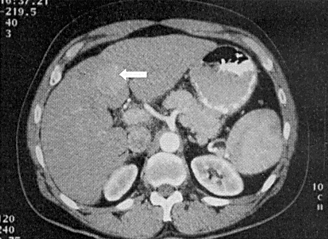Baseline AFP Levels Affect Ramucirumab Benefit in HCC
Hepatocellular carcinoma patients with baseline alpha-fetoprotein (AFP) levels greater than 400 ng/mL may derive greater benefit from second-line ramucirumab.
CT of a solitary hepatocellular carcinoma (arrow): arterial phase

Patients with hepatocellular carcinoma (HCC) may derive greater benefit from treatment with second-line ramucirumab if their baseline alpha-fetoprotein (AFP) levels are greater than 400 ng/mL, according to the results of the REACH study.
“Further analysis from the REACH study have identified AFP as a potential marker for selecting patients who may benefit from ramucirumab treatment in advanced HCC,” said Andrew X. Zhu, MD, from Massachusetts General Hospital Cancer Center, during his presentation at the 2015 ASCO Gastrointestinal Cancers Symposium. “A robust and clinically meaningful improvement in overall survival was observed in the population with elevated baseline AFP level.”
In REACH, patients with HCC with prior sorafenib treatment were randomly assigned to ramucirumab 8 mg/kg and best supportive care (n = 272) or placebo plus best supportive care (n = 272). At randomization, patients were stratified by geographic region or the etiology of the underlying disease.
The primary analysis results of REACH in patients with HCC were presented previously. Analysis of the intent-to-treat population showed no significant overall survival advantage for patients assigned to ramucirumab compared with those assigned placebo (9.2 months vs 7.6 months; P = .1391).
A forest plot of overall survival by subgroup showed that those patients with an AFP greater than 400 ng/mL derived an overall survival benefit from treatment with ramucirumab. According to Zhu, prior studies have also demonstrated an association between elevated baseline AFP levels and poor prognosis in HCC. Therefore, in this updated analysis of REACH, the researchers studied the relationship between baseline AFP and ramucirumab treatment effect.
Treatment with ramucirumab resulted in a significant survival advantage for patients with a baseline AFP level of 400 ng/mL or greater (7.8 months vs 4.2 months; HR = 0.674; P = .0059), but did not confer a survival advantage among patients with lower baseline AFP levels (10.1 months vs 11.8 months).
The researchers found that the group with an AFP level of 400 ng/mL or greater had a greater proportion of patients with underlying BCLC stage C disease, underlying hepatitis B, the presence of macrovascular invasion, and age greater than 65 years. There were also fewer patients in this group with an ECOG performance status of 0.
“In a post-hoc analysis of REACH, ramucirumab treatment led to a greater reduction in the risk of death in patients with progressively higher baseline AFP values,” Zhu said. “Further investigation of the relationship between baseline AFP level and angiogenesis inhibition is currently ongoing to better understand ramucirumab mechanism of action in HCC.”